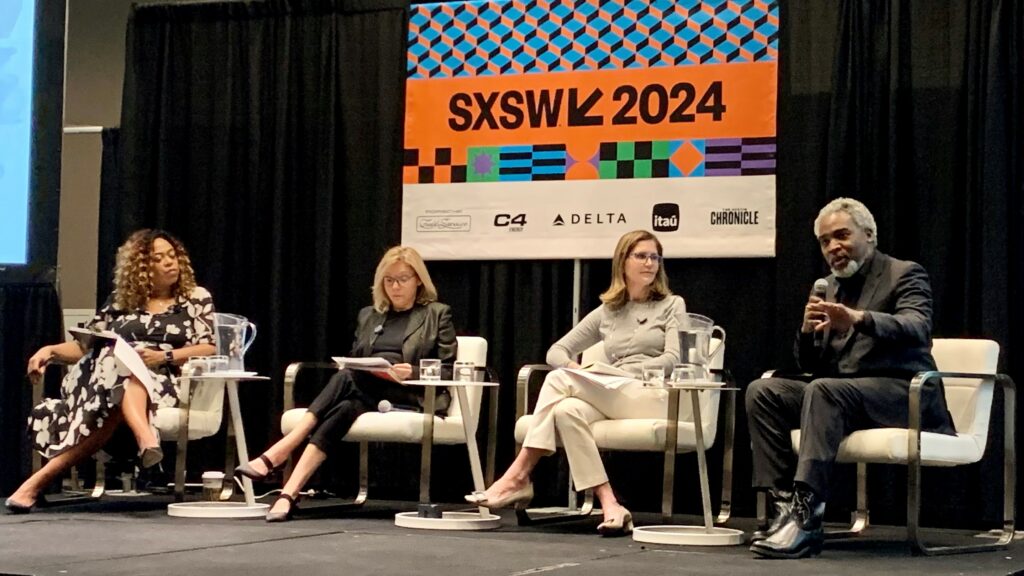Rule Makers and Breakers in the Space Race for Off-Earth Resources
From space junk to mining critical minerals on the Moon, this South by Southwest panel explored ambiguities in the governance of space ventures.
Published March 28, 2024

Space exploration not only signifies a pioneering frontier for deepening our comprehension of the universe but also serves as a pivotal gateway to unprecedented resources, technologies, and job opportunities, poised to emerge both on and beyond Earth’s bounds. What was once exclusively the domain of national governments has now evolved into a thriving commercial industry, fueled by the burgeoning participation of the private sector in space exploration. To guarantee the safety, accessibility, and positive impact of space exploration, it’s imperative to develop evolving governance mechanisms that effectively oversee resource allocation, foster international collaboration, prioritize safety and security, address ethical dilemmas, and tackle the escalating challenges of space debris and traffic management. On March 11, 2024, a diverse assembly of space investors, public and private stakeholders, ethicists, and enthusiasts congregated at Austin’s South by Southwest Conference to glean insights from the panel session titled ‘Governance Beyond Gravity: Unity & Exploration,’ helmed by Dr. Monique M. Chism, Under Secretary for Education at the Smithsonian Institution.
Satellite Superhighway: Redefining Space Access
Amid our captivation by the human presence aboard the International Space Station, the allure of Mars exploration, and the awe-inspiring vistas from the James Webb Space Telescope, it’s easy to overlook the bustling thoroughfare of satellites silently navigating Earth’s orbit. Remarkably, data from the tracking site Orbiting Now reveals a staggering count of over 9,600 satellites currently overhead, with SpaceX‘s Starlink network alone accounting for more than 6,000 of them.
The burgeoning satellite network not only amplifies global connectivity and intelligence capabilities but also signifies a democratization of space access, with over 70 nations, in conjunction with numerous private sector entities, having effectively launched satellites into low Earth orbit, endowing their operators with advanced communication and intelligence resources. The acquisition of precise Earth observation data, down to the millimeter level, fuels unmatched insights, opportunities, and competition.
Fellow panelist, Kirsten Bartok Touw, an aerospace, space, and defense tech investor and Co-Founder and Managing Partner of New Vista Capital underscored, “The concept of national security and protecting your country’s and your allies’ access to space, and all that is up there, is incredibly important.” However, Bartok Touw proposed that this unique and specialized business sector should not solely reside within the purview of governments. “We need to work with commercial companies—they iterate, they move faster, they design.” Beyond intelligence applications, Bartok Touw highlighted the numerous commercial opportunities in space, ranging from asteroid and lunar mining for rare Earth minerals to satellite monitoring for methane leaks, and even drug discovery, which can occur at an accelerated pace due to the absence of gravity in space. “This is a race for unexplored capabilities and areas. The first companies up there to lay claim are going to be the furthest and most advanced.”
Space Governance in Flux: Challenges and Opportunities
In the absence of established human settlements in space or local space governments, the space community navigates a complex web of governance policies crafted over decades. These include the foundational Outer Space Treaty of 1967, ratified by 112 nations, the 1979 Agreement Governing the Activities of States on the Moon and Other Celestial Bodies, colloquially known as the ‘Moon Agreement,’ ratified by a mere 18 nations, and the recent non-binding 2020 proposal, the Artemis Accords, which serves as an international legal framework aimed at orchestrating the peaceful exploration and utilization of space resources.
Panelist A.J. Crabill, National Director of Governance for the Council of the Great City Schools in Washington DC offered insights into the pivotal role of space, and space governance, in shaping the future of our society. “That future requires stepping out of our birthing cradle and being able to access resources beyond those that are terrestrial. However, the moment you have a lot of people doing that you’re immediately going to run into conflict. That’s when the need for systems of governance come into place. How do we protect both people and resources [and] how do we collaborate effectively around services that are needed? All of those become way more complicated outside of Earth’s atmosphere.”
Bartok Touw flagged that prior space governance policies relied on country-to-country agreements. But today, independent commercial operators like SpaceX, which launch and lease satellites for a variety of government and private entities, can limit the access that a country or corporation has in their region to space-based communications. “The state-to-state agreements that we had earlier [are] being disrupted today because now it’s not just country-to-country… it’s commercial entity-to-commercial entity. I would love to live in a world where all these nations and commercial entities could agree, but that is not the case we’re in.”
The Lack of an Enforcement Mechanism
Panelist Aida Araissi, Founder and CEO of the Bilateral Chamber of Commerce, injected some optimism into the discussion, remarking, “The countries that are at the forefront of accessing the Moon are [the United States], the Soviet Union, China, and India. It’s an exciting time.” However, as humanity’s quest to return to the Moon and journey to Mars intensifies, Araissi raised concerns about the governance of commercial activities, such as lunar mining. “Exactly whose jurisdiction is that, and how are we going to regulate that? That is the key question.” Bartok Touw echoed, “That is the problem, there isn’t an enforcing mechanism.”
Crabill adopted a pragmatic stance, invoking the satirical adage, “He who has the gold makes the rules.” He elaborated, “Unfortunately, we see this time and time [again] when we’re looking at governance systems—school systems, states, cities, nations—whoever has the keys of authority…the access to resources, does wind up making the rules. If we want space governance to follow our values, we have to be there first in a powerful way, establish industry, and establish resources. And then our values of bringing other people in coalition can be what carries the day.”
Reflecting on the evolution of space governance, Crabill noted that reaching consensus was easier during the theoretical discussions of the 1950s and 1960s. However, as society approaches the technological reality of widespread space access, the complexities of governance intensify. “Governing the imminent is much more complicated than governing the hypothetical.”
Learn more about the ethical, legal, and social issues relevant to space exploration and long-term human settlement in space at the upcoming event featuring a conversation with space ethicist, astrophysicist, and author Erika Nesvold: Off-Earth: Ethical Questions and Quandaries for Living in Outer Space.
